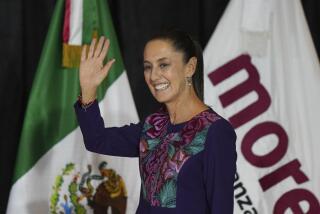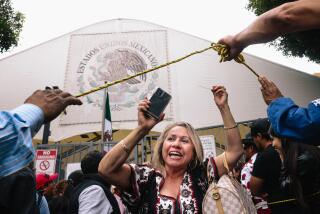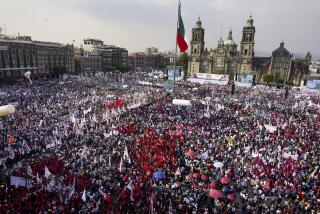CENTRAL AMERICA : Fear and Apathy Color Guatemala Presidential Vote : Neither candidate has dealt with human rights or civilian control of the military.
- Share via
GUATEMALA CITY — Continuing political violence, military abuse and human rights violations have combined with Tweedledee and Tweedledum candidates to create an atmosphere of indifference and fear in Guatemala’s presidential runoff election Sunday.
Although the election, for the first time in years, will provide a peaceful transition from one democratically elected president to another, opinion polls indicate that fewer than 60% of eligible voters will go to the polls.
The race is between Jorge Serrano Elias and Jorge Carpio Nicole, two right-wing businessmen with few real policy differences who were the front-runners in a first round of balloting in November.
Carpio, a wealthy newspaper publisher who failed in a presidential bid five years ago, led in the November vote, but he has since fallen behind Serrano in opinion polls, which indicate that the latter will win decisively.
Serrano, a Protestant fundamentalist, enjoys solid support from the estimated 30% of Guatemala’s population aligned with a growing evangelical movement, but his edge is mostly the result of Carpio’s reputation as a dull and politically unfocused candidate who has used his personal fortune and media strength to advance in politics.
A sense of personal distrust, rather than political disagreement, led all but a few of the 10 other candidates in the first round to reject Carpio’s bid for an alliance and to join instead behind Serrano’s candidacy.
Neither candidate has been able to spark much interest in his campaign or to overcome a public distaste for government in general, a dislike prompted by widespread corruption in the outgoing administration of President Vinicio Cerezo Arevalo, a collapsing economy and an accelerating pattern of political and human rights violence, much of it at the instigation of the military.
While complete statistics are not yet available for 1990, the Guatemalan Congressional Human Rights Office and other human rights monitors recorded a daily average of one death and one disappearance through October. The sorry record on human rights led the United States last month to eliminate all American military aid to this country.
Neither Serrano nor Carpio has dealt with the human rights situation in any concrete way during the campaign, beyond voicing platitudes. And neither has proposed any measures to bring the military, which has controlled Guatemala much of the last half-century, under true civilian control.
For example, while army personnel were held responsible for killing 11 Indians during a protest last month, neither candidate condemned the military when it failed to prosecute the killers.
“I don’t think either man has the will or the interest in taking on the army,” said one diplomat who monitors the human rights situation. “The military remains the most powerful institution in the country, and you don’t stay in office by challenging its power.”
And while both men have pledged to end corruption, neither has proposed solutions for economic problems, which include a 40% unemployment rate and a level of poverty that the United Nations says encompasses more than 70% of the population.
Edmund Mulet, a member of Carpio’s party, acknowledges that neither his candidate nor Serrano want to make major changes in an economic system that benefits both personally and their social class generally.
Another major factor in the lack of public confidence in government is the racial and cultural division between a white elite and the nation’s Indians who make up more than 57% of the population.
While Carpio has made an effort to win Indian support, most experts predict that the nonwhite population will, as it has in the past, ignore the election. “The Indians have no stake in national politics,” one Carpio adviser said. “They don’t trust any of us.”
“In reality,” said a European diplomat, “there really is no pressure on either Carpio or Serrano to do anything substantial. There is no organized moderate, let alone leftist, opposition; the Indians are both afraid and indifferent, and the military likes things the way they are.”
More to Read
Sign up for Essential California
The most important California stories and recommendations in your inbox every morning.
You may occasionally receive promotional content from the Los Angeles Times.













